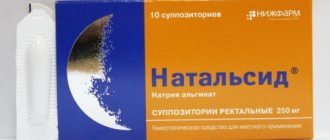The drug Bioparox during pregnancy is prescribed if the expectant mother suffers from infectious diseases of the upper respiratory tract. As with other medications, this remedy is recommended to be used with caution to avoid negative consequences for the unborn baby.
What kind of medicine
In women during pregnancy, especially in the first trimester, the immune defense is seriously suppressed so that the body cannot reject the fertilized egg. Due to immune weakness, even banal colds become a frequent, but by no means safe, occurrence for mothers. If before conception the patient did not particularly delve into the intricacies of choosing medications, now, in the first trimester, she can only use safe medications prescribed by the gynecologist against colds. Quite often, when treating pregnant women for nasal congestion, cough and sore throat, doctors prefer Bioparox.
- Bioparox belongs to the category of antibiotics that have a local effect.
- The drug is produced in aerosol form for inhalation.
- The active element of the antibiotic is fusafungin, which disrupts the reproduction and growth of pathogenic microorganisms that provoke ENT infections. These include staphylococci and mycoplasmas, streptococci or anaerobic bacteria and candidal fungi.
- Bioparox is considered one of the most effective medications that have anti-inflammatory, antifungal and antibacterial effects.
- The components of the aerosol do not penetrate into the bloodstream and therefore do not have a systemic effect.
- They work locally, relieving inflammation and destroying bacterial microorganisms.
- When used, fusafungine is usually distributed throughout the oral cavity, pharyngeal surface and nasal mucous membranes. It can be detected in microconcentrations in plasma, which is why it is considered a safe drug.
In fact, the active element of the aerosol is classified as a polypeptide local antibiotic substance with anti-inflammatory properties.
ARVI and the first trimester
Hello. I’m 8-9 weeks pregnant, I haven’t registered yet. She fell ill with an acute respiratory viral infection (the whole family is sick - husband and daughter). Symptoms: severe sore throat, cough, sore nose, runny nose, temperature 37.5. I'm worried about how all this will affect the condition of the expected child. I'm interested in the opinions of those who were also in a similar situation during pregnancy.
Interesting: How to achieve a caesarean section without indications
Woman.ru experts
Find out the opinion of an expert on your topic
Grib Lyudmila Nikolaevna
Psychologist. Specialist from the site b17.ru
Semina Irina Alexandrovna
Psychologist, Personal meeting on Skype. Specialist from the site b17.ru
Valeria Bertnik-Yuryeva
Psychologist, Psychologist-guide. Specialist from the site b17.ru
Irina Vladimirovna Chirtsova
Psychologist, Supervisor, Family psychologist, Psychoanalyst. Specialist from the site b17.ru
Ivanova Svetlana Yurievna
Psychologist, Parapsychologist. Specialist from the site b17.ru
Aleynikova Natalya Valerievna
Psychologist. Specialist from the site b17.ru
Olesya Valerievna Baburina
Psychologist. Specialist from the site b17.ru
Volkova Irina Vladimirovna
Psychotherapist, Sexologist. Specialist from the site b17.ru
Rodionova Anna
Psychologist, Gestalt therapist, business coach. Specialist from the site b17.ru
Reutskaya Inga Gennadievna
Psychologist, Online consultant. Specialist from the site b17.ru
Don’t worry, everything will be fine, ARVI is not like rubella. In books, of course, they write all sorts of horrors, but in practice, as a rule, there are no consequences. Just keep in mind that you can only take certain medications.
author, don't worry. I was sick with bronchitis in the first weeks, I took antibiotics because... treatment with folk remedies did not produce results and bronchitis almost turned into pneumonia. everyone is alive and well. My advice is to definitely consult a doctor.
In both pregnancies I was sick in the early stages, maybe my immunity is weakening due to B? Everything is ok, although I was very worried.
I was sick 3 times in the first trimester, although the temperature was only once at 37.5 maximum, and I was actively treated only with approved methods (no antibiotics, tablets, syrups, etc. - these are more dangerous than viruses). The doctor said that a temperature above 37.5 is dangerous - only if it lasts for more than 3(!) days! In other cases, ODS and acute respiratory infections are not dangerous to the child. Allowed only to dissolve eucalyptus tablets and eucalyptus herbs for inhalation. And of course BED REST. As a result, the ultrasound at 12 weeks revealed no abnormalities, the tests were normal!
bronchitis backfired on me - a difficult birth, a piece of the baby’s place grew in, they cleaned it, they say it was because of an infection in the first trimester. Screening showed this to me based on the placenta. And so all the time there were excellent tests and she gave birth on time. So no one can give a guarantee
bronchitis backfired on me - a difficult birth, a piece of the baby’s place grew in, they cleaned it, they say it was because of an infection in the first trimester. Screening showed this to me based on the placenta. And so all the time there were excellent tests and she gave birth on time. So no one can give a guarantee
Related topics
do not worry. the main thing is that the temperature is not higher than 37.5. take Hexaliz or Lysobact. they can be used during pregnancy. and register quickly
And then children develop hemangiomas and other crap...
And then children develop hemangiomas and other crap...
Guest And then children get hemangiomas and other crap... Mavsesyan? ))))
10 this is from the Interns)) I just saw a familiar word “hemangioma”
I also got sick during pregnancy and in the first trimester. and now, in the third, I got sick during the heat. Yes, immunity really decreases. I was treated - bed, herbal tea with honey, sleep. I recover in 2 days. All pregnancy tests were normal. And as for hemangiomas - well, it will be born, we'll see...
Buy Grippferon and bury it, it is approved for pregnant and lactating women. It was necessary to do this a long time ago, for prevention, since everyone got sick. But if it's the first or second day, it's not too late
Thanks to everyone who responded. We are already on the mend, we were treated with eucalyptus inhalations, tea with honey, gargling with a soda solution with added salt and a few drops of iodine (my husband found the recipe). Grippferon was also dripped into the nose.
I'm currently 6-7 weeks away. I also got sick: I do inhalations with tea tree oil, drink linden for coughs, tea with honey. By the way, tea tree oil helps very well, I inhaled it twice and the cough noticeably subsided. And if you have a runny nose, you can put a couple of drops on your pillow before going to bed! During pregnancy, rarely does anyone not get sick, the main thing is not to develop bronchitis and sinusitis!
And I’m in my fifth week.. My immunity has dropped very much. ARVI was indistinct for only two days and then everything turned into bronchitis... no temperature. Is it dangerous? I’m generally hysterical, one after another, with an interval of two weeks, herpes appeared on my lip, this is an incomprehensible ARVI, now bronchitis. I'm generally afraid to go outside.
I’m 5 weeks old, I’m sick with ARVI, cough, runny nose, pain in the lower abdomen!! I think the main thing is not to prepare yourself for the worst, pregnancy is a difficult and important stage in a woman’s life, you need to go through a lot. the main thing is an optimistic attitude.
I want to share my story, because I am very familiar with your experiences, 2 years ago I cried too much, re-read all the forums! I got sick with pneumonia + neuralgia! I was already coughing up blood! They took me by ambulance to the hospital, they injected me with painkillers like the ones you inject during operations, I’m already silent about antibiotics! A week has passed in the hospital and I find out that I am pregnant - 4-5 weeks! All doctors unanimously say abortion and nothing more, with such antibiotics only abortion! Consiliums were held, relatives had a brain drop, first pregnancy! In general, I wouldn’t wish what I went through on anyone! The only thing I want to say girls is pray and don’t listen to anyone! Children with pathologies are also born to normal mothers. My baby is already a year and a month old and I am the happiest mother in the world. Everything is fine with us, everything will be fine. Take care of yourself and your bellies.
pregnancy 10 weeks. Last menstruation December 1-3. On December 28 I caught a cold, took antigripin (powder) for 3 days, Hexoral in my mouth. Everything went away. On January 4 I was diagnosed with bronchitis (chronic bronchitis for 4 years already) I took it. Ciprofloxocil for 6 days, ACC-long, euphyllin. At ten weeks I got registered and was recognized again wheezing suggests abortion. I've been crying all day, they gave me 1 day to think about it. Help, what should I do?
Girls, help. I do not know what to do. I got sick with ARVI at 2-3 weeks of pregnancy, I didn’t know that I was taking antibiotics while pregnant. The temperature stayed 37.5 all week, and was 39.5. The husband insists on an abortion. Doctors say everything differently. They are frightening that there may be defects that no tests or ultrasounds can show. Already 7 weeks, first pregnancy. I am very afraid for the baby and my husband will not support me. What should I do?
pregnancy 10 weeks. Last menstruation December 1-3. On December 28 I caught a cold, took antigripin (powder) for 3 days, Hexoral in my mouth. Everything went away. On January 4 I was diagnosed with bronchitis (chronic bronchitis for 4 years already) I took it. Ciprofloxocil for 6 days, ACC-long, euphyllin. At ten weeks I got registered and was recognized again wheezing suggests abortion. I've been crying all day, they gave me 1 day to think about it. Help, what should I do?
Hello! I'm wildly confused, what should I do?! The situation developed as follows: my husband and I decided that it was time for us to have a baby, and we started implementing this idea on 08/02/11. , almost the next day I felt pain in my chest (although I’m still far from my period), which is still going on, I’m hungry, my BT increased to 37 degrees, but at that time my husband got sick, so I didn’t know if it was me I’m getting sick, or these are the first signs of pregnancy, after a couple of days the condition worsened, I actually got sick: temperature 38, sore throat, runny nose, cough. So I'm completely terrified! It’s too early for the test, in case I’m pregnant. and what should I do, because you can’t get sick at all in the first trimester, but I’m completely unstuck. I’m also afraid to take some medications (I only took Theraflu a couple of times, it’s Lazolvan so I’m afraid to drink it), or is it better to go buy a pastenor and that’s it? or what? Three days ago I felt characteristic pain in the lower abdomen, I thought I was having my period, but no, it stopped. please, help. All my nerves are gone.
Interesting: Parents have blood type 2 and 2, what will the child have?
Hello! I’m 11-12 weeks old. I’ve been sick for 3 days now, temperature 37.2, cough, runny nose, I’m very worried about the baby, how this can affect him. sometimes there are pains in the lower abdomen, stabbing. Doctors do not advise anything useful! Before I became completely ill, for several days I just had a temperature of 37.
Elena, how are you doing now? I have a similar situation. My last period was on August 2, now I have ARVI. Among the medicines - oscillococcylum, bioparox, aquamaris. Temp 37.3 maximum. The condition is terrible
Hello everybody! I have a 10 week period. At 8 weeks my son brought ARVI. Temperature 38.5 at night and 37.5 during the day. Within 4-5 days. The complication went to the trachea. It didn't reach the bronchi. Saw Oscilococcinum, Bioparox, Pinosol, Lizobykt, Tantum Verde. I refused Bioparox for the first three days. Then, when the condition worsened, I began to take it. Today I am still weak, my snot is green and viral, and I have no fever. I visited the doctor. I did an ultrasound. “The fetus is alive,” said the ultrasound specialist, after which I felt faint. Could it really have been different? There was no talk of any termination of pregnancy at all with the doctor. He advised me to go to their therapist, but I didn’t get it. I know that this happened to many people and they gave birth to healthy children. I also know who were not sick and were born practically non-viable. It seems to me that one should not get rid of pregnancy because of this. We are not fascists.
I want to share my story, because I am very familiar with your experiences, 2 years ago I cried too much, re-read all the forums! I got sick with pneumonia + neuralgia! I was already coughing up blood! They took me by ambulance to the hospital, they injected me with painkillers like the ones you inject during operations, I’m already silent about antibiotics! A week has passed in the hospital and I find out that I am pregnant - 4-5 weeks! All doctors unanimously say abortion and nothing more, with such antibiotics only abortion! Consiliums were held, relatives had a brain drop, first pregnancy! In general, I wouldn’t wish what I went through on anyone! The only thing I want to say girls is pray and don’t listen to anyone! Children with pathologies are also born to normal mothers. My baby is already a year and a month old and I am the happiest mother in the world. Everything is fine with us, everything will be fine. Take care of yourself and your bellies.
Hello! I'm wildly confused, what should I do?! The situation developed as follows: my husband and I decided that it was time for us to have a baby, and we started implementing this idea on 08/02/11. , almost the next day I felt pain in my chest (although I’m still far from my period), which is still going on, I’m hungry, my BT increased to 37 degrees, but at that time my husband got sick, so I didn’t know if it was me I’m getting sick, or these are the first signs of pregnancy, after a couple of days the condition worsened, I actually got sick: temperature 38, sore throat, runny nose, cough. So I'm completely terrified! It’s too early for the test, in case I’m pregnant. and what should I do, because you can’t get sick at all in the first trimester, but I’m completely unstuck. I’m also afraid to take some medications (I only took Theraflu a couple of times, it’s Lazolvan so I’m afraid to drink it), or is it better to go buy a pastenor and that’s it? or what? Three days ago I felt characteristic pain in the lower abdomen, I thought I was having my period, but no, it stopped. please, help. All my nerves are gone.
Hi all! I’ve been sick with ARVI for 4-5 weeks, and I’ve been sick with ARVI for a whole week. I'm very worried about how it will affect the baby.
Two weeks ago I had the flu. I was treated with everything. I fell ill again for 4 days, yesterday I found out that I was pregnant. 25 years old, first pregnancy. I haven’t gone to a consultation yet. My sister fell ill two weeks before giving birth, and my daughter was born with inflammation. 3 weeks since treatment (
Two weeks ago I had the flu. I was treated with everything. I fell ill again for 4 days, yesterday I found out that I was pregnant. 25 years old, first pregnancy. I haven’t gone to a consultation yet. My sister fell ill two weeks before giving birth, and my daughter was born with inflammation. 3 weeks since treatment (
Hello girls. I have 6-7 weeks. It's a little smeared here (they say this happens after airplane flights). I'm registering for a bunch of tests. I feel like I'm getting sick. apparently it was blown. The doctor told me to drink more and nothing else. Now all the baby’s organs are developing. I think everything will work out. I don’t care about work, I’m on sick leave. I sleep and sleep.
Hi all! I had ARVI at 6-8 weeks of pregnancy. The doctor tried to persuade me to have an abortion. But since this was my first pregnancy, I didn’t even want to hear about abortion. They were frightened by the fact that under the influence of the virus at this stage, internal organs might not form correctly.. At my own peril and risk, I carried and gave birth to a beautiful baby. The boy was born beautiful, but the virus really affected him. He was born with hypospadias. The operation, thank God, is not necessary, as the surgeon explained to us, this is a mild form of hypospadias. This was explained by the fact that I was ill in the early stages of pregnancy. The boy often suffered from colds. Then obstructive bronchitis began. To this was added persistent enuresis. In general, I suffered with him as a child. Now he is 17 years old. Tall, handsome guy. But he is still registered with a surgeon with hypospadias. Sick of colds less often. Looking back, I still remember that conversation in the gynecologist’s office with the referral for an abortion. A woman still has to feel what to do. If she wants this child, she will give birth no matter what viruses. I just don’t even want to think what would have happened if I had listened to the doctor. My son for me is my biggest VICTORY, he is my PRIDE. Be healthy and have babies!
Psychologist. Specialist from the site b17.ru
How it works
Inhalation use ensures the deposition of medicinal components on the mucous membranes. Thanks to the aerosol formula, the respiratory structures are completely covered with the medicinal substance, which simultaneously penetrates the sinus and bronchial tissues.
Warm chamomile tea will relieve the condition
The use of an aerosol reduces exudation processes, gently eliminates swelling and improves respiratory functions, facilitating nasal breathing. Practice shows that the therapeutic effectiveness of using Bioparox spray increases significantly if treatment is started at the very beginning of the infectious process. The use of the spray does not reduce the therapeutic effect of systemic antimicrobial drugs and does not cause acquired or cross-resistance.
If the patient has a sore throat, then under the influence of Bioparox the painful symptoms quickly stop, swallowing abilities are restored, and swelling from the pharynx subsides. For rhinitis, fusafungine helps to quickly relieve congestion, relieve swelling of the nasal mucosa, reduce mucus secretion, and restore full breathing. In case of respiratory infections, the manifestations of cough are reduced, and sputum is removed more actively.
But you can take Bioparox spray only for the period of time determined by the doctor. With long-term therapy, some patients develop an addiction to fusafungine, which negatively affects the effectiveness, because pathogenic microorganisms develop resistance to the drug. As a result, with long-term use, instead of cure, a further worsening of the cold infection may occur.
Use at different stages of pregnancy
Bioparox is a strong antibiotic, so its use in the early and late stages of pregnancy has a number of features. Only an obstetrician-gynecologist or therapist can determine a treatment regimen based on test results and taking into account all possible risks .
Interesting: Cough Remedies During Pregnancy 2nd Trimester
1st trimester
In the first three months, all systems and organs begin to form in the embryo. Some infectious diseases that are relatively harmless to the mother can be fatal to the fetus. But antibiotic drugs are not always harmless to the child. Bioparox, as a local drug, is preferable to systemic antibacterial agents in early pregnancy .
Do not self-medicate under any circumstances; entrust the choice of medication to your doctor.
2nd trimester
The formation of the child's body continues. The fetus is protected by the placenta not only from the effects of viruses and infections, but also from the possible consequences of the use of antibiotics. Doctors believe that Bioparox does not have a negative effect on the child, so they often prescribe it to women 4–6 months pregnant.
3rd trimester
At the beginning of the last third of pregnancy, there is a risk of premature birth. Therefore, the use of any drugs, especially antibiotics, should be under medical supervision.
The use of Bioparox is possible only after consultation with your doctor and a specific diagnosis; in the last trimester of pregnancy, strict medical supervision is also especially necessary
Bioparox can help a woman cope with respiratory diseases, allowing her to abandon the use of stronger systemic antibacterial agents that penetrate the bloodstream.
Indications
Aerosol Bioparox is prescribed to patients for local treatment of infectious and inflammatory respiratory pathologies. The medication is effectively used in the treatment of pathologies such as laryngitis or tracheitis, bronchitis and pharyngitis, rhinitis or nasopharyngitis, sinusitis, tonsillitis or sinusitis. The medication is also prescribed during the postoperative recovery period after removal of the tonsils. For acute tonsillitis, Bioparox is not always used, although patients treated with this aerosol leave a positive opinion.
- Usually, for angina, Bioparox is important to use in the catarrhal inflammatory stage, when the patient is concerned about swelling of the tonsils and hyperemia of the mucous membranes of the throat.
- But during exacerbations of chronic tonsillitis, which usually pass more mildly, the aerosol is used quite often.
- If the acute form of tonsillitis is aggravated by the formation of pustular formations on the pharynx, then local antibiotic therapy loses all meaning and is ineffective. If there is no improvement in the patient’s condition, then Bioparox is discontinued and systemic antibiotic therapy is prescribed instead.
- For sinusitis, the effectiveness of the aerosol is high only at the initial stage of development of the pathological process. Typically, sinusitis occurs as a bacterial complication of acute respiratory viral infection and is manifested by prolonged nasal congestion, hyperthermia and headaches.
Tonsillitis or sinusitis and other infections of a similar nature cannot be eliminated with Bioparox alone. There is a possibility of stopping the disease if the aerosol is used from the first hours of the infection. If the use of the spray does not give the desired results, then systemic antibiotic therapy is prescribed.
Is it possible for pregnant women
The spray is administered exclusively as an inhalation procedure, and therefore can accumulate exclusively in the oropharyngeal and nasopharyngeal mucous membranes, where it actively expresses an antibacterial effect. The active components of the medicine cover the affected mucous membranes and partially seep into the bronchi. Since only a microdose concentration of the drug is allowed in the bloodstream, it is not capable of having any systemic effect. But still, Bioparox during pregnancy in the 2nd trimester and during other periods is prescribed with caution, in the presence of serious indications.
You need to monitor your baby's condition very carefully.
Clinical studies of the drug have shown that fusafungin cannot overcome placental protection and does not have an embryotoxic effect on the fetus. Also, the medication is not able to affect the general course of prenatal development and delivery processes. There is no exact data regarding the penetration of the components of the drug into breast milk, therefore it is not recommended to take it during breastfeeding; use is only possible as prescribed by a gynecologist.
Of course, treating coughs and minor runny noses with antibiotics like Bioparox is unacceptable, and at any trimester of pregnancy. In such clinical cases, it is better to use a nebulizer, rinse and lie in bed for several days. The purpose of the Bioparox aerosol is relevant if the immune system cannot suppress infectious processes, they spread rapidly, aggravating the patient’s condition. If there are pronounced clinical symptoms and the risk of complications is high, then, according to a doctor’s prescription, pregnant women can use Bioparox in treatment. This includes any serious respiratory infections.
When prescribing Bioparox to pregnant women in the second and any other trimester, it is important to determine the type of pathogen. The medication is effective exclusively against fungal and bacterial microorganisms. For viral infections, it is useless to prescribe an aerosol, because it will not be able to cope with viral pathogens. It is also important to use the product at the very initial stages, then it will exhibit the maximum degree of effectiveness, quickly stop the further spread of the infectious process and prevent many complications.
Bioparox during pregnancy - reviews
The opinions of both women and obstetricians-gynecologists regarding the use of Bioparox during pregnancy are very different. Doctors are ambivalent about this drug. Some consider it an ideal anti-inflammatory drug that quickly improves a woman’s condition without having a general effect on her body and the condition of the baby. Therefore, Bioparox is often safely prescribed to pregnant patients. But it is worth noting that there is no scientific evidence that Bioparox is safe for the fetus, so a woman has to rely only on the experience of her doctor.
There are also gynecologists who are categorically against prescribing Bioparox during pregnancy, especially in the 1st trimester. Their fears are caused by the possible development of bronchospasm, which most often occurs in women with allergic diseases (and during pregnancy they always worsen). This side effect occurs at the time of injection and subsequent inhalation of the spray. In their opinion, Bioparox can provoke serious complications that significantly exceed its therapeutic effect, so prescribing it to pregnant women is very risky.
Reviews from women who use Bioparox are also different. There is evidence that in many women, inhalations caused discomfort, and after them weakness, nausea, and malaise appeared. For others, on the contrary, recovery occurred much faster, and adverse reactions did not appear at all. Since each body reacts to treatment in its own way, we can say that Bioparox can both harm and bring relief during illness.
Before deciding to take Bioparox, you need to carefully weigh all the risks from antibiotic inhalation and from the disease itself, and choose the algorithm of action that is safest for the baby.
Instructions
When using an antibacterial spray, the instructions for use must be followed.
- The aerosol is prescribed for nasal or oral inhalation. 4 injections into the oral cavity or two into the nostrils are indicated, the procedure is carried out four times a day.
- To get the maximum therapeutic effect of the antibiotic, you need to follow the recommended dosages, rules and course duration. Do not stop use prematurely if there are clear signs of improvement, otherwise you may provoke a relapse of the infection.
- The standard therapeutic course involves the use of an aerosol in the described dosages for a week.
If pathological symptoms persist or worsen, you should consult a doctor. If there are pronounced clinical symptoms of an infection of bacterial origin, then obstetrician-gynecologists sometimes recommend the use of an aerosol in tandem with a systemically active antibiotic.
Methods of application
Before using the can, press the bottom of the can four times to activate it. Then you should put on the desired attachment and use it for its intended purpose. The white nozzle is intended for inhalation irrigation into the oral cavity, and the yellow one - into the nose.
Your doctor will help you choose a safe remedy.
When inhaling into the nasal passages (for the treatment of sinusitis, sinusitis, nasopharyngitis or rhinitis), the canister should be held in a vertical position with the nozzle up, holding the container between the index and thumb. Before administering the medicine, you must first clean the nasal cavities. Then the nozzle is inserted into the nose, and the other nostril is clamped with a finger, the mouth is closed. You need to take a deep breath while simultaneously pressing the bottom of the can.
When using the drug through the oral cavity (for the treatment of tonsillitis, pharyngitis, laryngitis, etc.), a white nozzle is put on the can. It must be inserted into the mouth, clamped between the lips. You need to press the canister and inhale deeply to get complete irrigation of the pharynx. Used attachments must be disinfected once every 2 days by wiping with alcohol.
Bioparox dosage
Bioparox for coughs and inflammatory processes in the oropharynx is prescribed as inhalation 4 times a day, 4 presses per application. Inhalations into the nose are done 2 times, also 4 times a day, unless there are other individual instructions from the attending physician. To achieve the maximum effect from using the drug, you must follow exactly all the doctor’s dosing instructions and adhere to the instructions for using the nozzles. The duration of treatment is 4-7 days. To achieve complete recovery, after the first signs of improvement in well-being appear, you should not stop taking Bioparox. With pronounced symptoms of infectious inflammation, joint therapy with systemic antibiotics is acceptable, but there is no data on its interaction with other drugs.
Features of using Bioparox in pregnant women
The aerosol is prescribed to pregnant women with caution. The instructions say that the active ingredients are not absorbed into the bloodstream, however, when applied topically, bronchospasms are likely to develop. However, there is no data whether the fetus experiences similar bronchospasms or not. In accordance with the period of prenatal development, there are recommendations for the use of Bioparox.
At the first stage, when active embryogenesis is underway, doctors select the safest medications possible due to the risk of developing cold complications. In this case, the medications used should not affect the fetus. If at this stage of gestation the mother gets sick with a serious respiratory bacterial infection, this can lead to defects in intrauterine development. Bioparox is not contraindicated at this gestational stage, but is prescribed only by a doctor.
Although Bioparox is not absorbed into the blood, its microdose concentrations are still present, and therefore, when using an aerosol in the first gestational weeks, it does not exclude an effect on the embryo. Therefore, most doctors prescribe Bioparox only for very compelling indications. But in comparison with systemic antibiotics, the spray is much safer, which is why it is preferred. If therapy cannot be avoided in any way, then for patients in the early stages Bioparox is prescribed in minimal doses - 4-5 injections per day.
Embryogenesis has ended in the second trimester, so mommy can relax. Using an aerosol during this period is also not prohibited, but still not thoughtlessly, but following the instructions and precautions. At this gestational stage, the baby may suffer from hypoxia, so it is necessary to first discuss the possibility of using Bioparox.
Her immune functions have already become somewhat stronger, and therefore she tolerates infectious pathologies much easier. The body also becomes much more resistant to adverse reactions of various drugs, and with Bioparox there are no side effects at all. The fetus is already strong, even if a small dose of the drug penetrates, there will be no harm to the baby.
Other factors
Bacterial infections at the last stage of prenatal development can provoke premature onset of delivery, so health now needs to be especially protected. Timely use of an antibacterial aerosol in treatment will help eliminate severe complications of such infections and promptly stop the further spread of pathology. Typically, in the second trimester, Bioparox is used 3 injections every 4 hours.
In some cases, it is recommended to wear a support bandage
Practice shows that in later stages the use of the drug does not disrupt the birth process and does not affect the timing of delivery, and does not harm Bioparox to the baby in the neonatal period. In the 3rd trimester, the patient may be bothered by gestosis, characterized by swelling, including in the larynx or face. Therefore, it is necessary to exclude allergic reactions to the drug in order to avoid breathing problems.
When can Bioparox be prescribed during pregnancy?
Obviously, it is unacceptable to treat simple rhinitis or minor coughing with strong antibiotics during pregnancy. Simple rinses, use of a nebulizer and bed rest are more suitable for this. Bioparox is prescribed in cases where the female immune system cannot cope, and the infection begins to multiply rapidly, causing a deterioration in the woman’s health.
If the clinical manifestations of the disease are very vivid, and there is also a risk of developing dangerous complications, for example, sinusitis or pneumonia, the doctor considers the advisability of prescribing Bioparox.
According to the instructions, Bioparox is indicated for stopping the inflammatory process that affects the upper respiratory tract. During pregnancy it is used for the following pathologies:
- rhinitis of any stage and etiology;
- tracheitis;
- laryngitis (except viral);
- acute tonsillitis or exacerbation of the chronic form;
- sinusitis, including purulent;
- pharyngitis.
An important point at the stage of its appointment is the identification of the pathogen. Bioparox effectively destroys only bacteria and fungi. It is not advisable to prescribe it for viral diseases - the drug simply will not help, since it does not affect the vital activity of viruses.
Important! Bioparox should be used in the first stages of the disease. This allows you to quickly stop the spread of germs and prevent the development of complications.
Possible adverse reactions
In rare cases, Bioparox can cause adverse reactions that manifest themselves in different ways:
- Feeling of excessive dryness in the nasopharynx, mouth, sneezing, coughing, taste disturbances or nauseating irritation of the pharynx. These reactions are transient, so treatment is not canceled.
- It is possible to develop a local skin reaction or allergy to mucous tissues, which is manifested by swelling and hyperemia of the tissues, bronchospasm or superinfection. In case of such reactions, therapy is stopped.
If symptoms occur in the area of organic structures of the respiratory system, larynx or skin due to the high risk of anaphylaxis, an urgent need for intramuscular injection of epinephrine may arise.
In very rare cases, an overdose of Bioparox can occur, the symptoms of which are numbness of the tongue and throat, discomfort and dizziness. In such a clinical situation, it is necessary to carry out competent symptomatic therapy.
How does it affect the fetus and pregnancy?
The official annotation for the drug does not contain information regarding the teratogenic or toxic effects of the antibiotic, which is due to the inability of the drug components to penetrate the bloodstream. If the patient does not have individual contraindications, allergic hypersensitivity or intolerance to Bioparox, then the use of the aerosol does not cause any problems with gestation and fetal development.
The drug contains a component - propylene glycol, which sometimes provokes skin irritations. Bioparox does not interact undesirably and goes well with any medications. It also does not affect performance, reaction speed and concentration, so it can be used when driving vehicles or working with automated mechanisms.
Is it possible or not to use Bioparox in the 1st, 2nd, 3rd trimester of pregnancy: pros and cons
As you know, the use of antibiotics during pregnancy is extremely undesirable, but, unfortunately, this cannot always be avoided. Bioparox is also an antibiotic. But it does not penetrate the systemic bloodstream (and therefore to the fetus), but acts only locally, in the area of its application (that is, in the nasal and oral cavity).
Despite Bioparox being an antibacterial drug, it is often prescribed to expectant mothers. Because the risk of developing the disease exceeds the probable danger from using this medicine. Both doctors and patients believe that it is better to resort to using an aerosol for 2-3 days than to allow complications of the disease, which will require taking systemic antibiotics (that is, those that pose a real danger to the fetus).
Meanwhile, it cannot be said with certainty that Bioparox is absolutely safe for unborn babies. Similar studies have not been conducted among pregnant women, but experiments with animals did not reveal the teratogenic (damaging to the fetus) effect of Bioparox. Consequently, many doctors do not believe that it is dangerous. Moreover, over many years of practice of using this drug among pregnant women, no negative effects on the fetus were recorded. Even the women themselves claim that they did not observe any consequences of treatment, although sometimes they were forced to resort to this aerosol repeatedly during pregnancy.
Contraindications
Bioparox has virtually no contraindications; it is not prescribed only in the presence of individual intolerance. The aerosol should be used with caution in persons predisposed to allergic reactions or bronchospasms.
Bioparox is a fairly effective and gentle antibiotic for pregnant women, so it sometimes saves you from serious bacterial infections and their complications. The main thing is to follow the instructions of your obstetrician-gynecologist, follow the instructions for use and dosage, then no harm will arise from using the aerosol.
Contraindications and side effects, price
Intolerance to any of these extracts is a contraindication for use. Fusafungine rarely causes an allergic reaction. If this happens, then use of the aerosol should be stopped immediately. A woman may have:
- disturbance of the sense of taste;
- conjunctival hyperemia;
- respiratory tract reaction: frequent sneezing, cough, dry throat; swelling of the larynx, asthma attack or bronchial spasm, but such manifestations are rare;
- from the gastrointestinal tract, vomiting, nausea, and stool disorders may occur;
- Skin rashes, itching or swelling are very rare.
These reactions of the body must be reported to the therapist. Reviews stating allergic reactions when taking Bioparox are a rare occurrence. The medicine is available in a 10 ml aluminum bottle. A special nozzle doses the volume of release. The drug at the pharmacy costs more than 500 rubles.
Among analogues, Isofra has an anti-inflammatory and antimicrobial effect. The drug costs about 200 rubles. It should be used carefully during pregnancy, strictly as prescribed by the doctor.
The instructions for use allow the use of Tantum Verde by women during pregnancy and lactation. This is a spray with a special nozzle. It is prescribed for the treatment of streptococcal infections of the throat and nose. The drug costs about 400 rubles.










